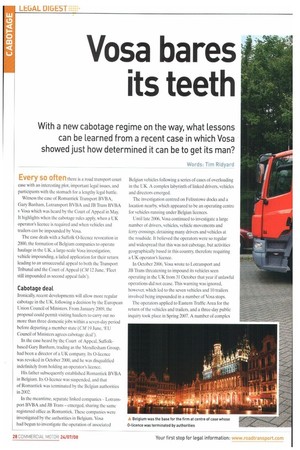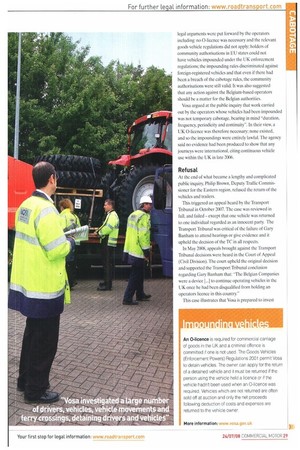Vosa bares Its teeth
Page 28

Page 29

If you've noticed an error in this article please click here to report it so we can fix it.
With a new cabotage regime on the way, what lessons can be learned from a recent case in which Vosa showed just how determined it can be to get its man?
Words: Tim Ridyard Every so often there is a road transport court case with an interesting plot, important legal issues, and participants with the stomach for a lengthy legal battle.
Witness the case of Romantiek Transport BVBA, Gary Banham, Lotranspor-t BVBA and JB Trans BVBA v Vosa which was heard by the Court of Appeal in May. It highlights when the cabotage rules apply, when a UK operator's licence is required and when vehicles and trailers can be impounded by Vosa.
The case deals with a Suffolk 0-licence revocation in 2000, the formation of Belgium companies to operate haulage in the UK. a large-scale Vosa investigation, vehicle impounding, a failed application for their return leading to an unsuccessful appeal to both the Transport Tribunal and the Court of Appeal (CM 12 June, 'Fleet still impounded as second appeal fails').
Cabotage deal Ironically, recent developments will allow more regular cabotage in the UK, following a decision by the European Union Council of Ministers. From January 2009, the proposal could permit visiting hauliers to carry out no more than three domestic jobs within a seven-day period before departing a member state (CM 19 June, 'EU Council of Ministers agrees cabotage deal').
In the case heard by the Court of Appeal, Suffolkbased Gary Banham, trading as the Mendlesham Group, had been a director of a UK company. Its 0-licence was revoked in October 2000, and he was disqualified indefinitely from holding an operator's licence.
His father subsequently established Romantiek BVBA in Belgium. Its 0-licence was suspended, and that of Romantiek was terminated by the Belgian authorities in 2002.
In the meantime, separate linked companies — Lotransport BVBA and JI3 Trans — emerged, sharing the same registered office as Romantiek. These companies were investigated by the authorities in Belgium. Vosa had begun to investigate the operation of associated Belgian vehicles following a series of cases of overloading in the UK. A complex labyrinth of linked drivers, vehicles and directors emerged.
The investigation centred on Felixstowe docks and a location nearby, which appeared to be an operating centre for vehicles running under Belgian licences.
Until late 2006, Vosa continued to investigate a large number of drivers, vehicles, vehicle movements and ferry crossings, detaining many drivers and vehicles at the roadside. It believed the operators were so regular and widespread that this was not cabotage, but activities geographically based in this country, therefore requiring a UK operator's licence.
In October 2006, Vosa wrote to Lotransport and JB Trans threatening to impound its vehicles seen operating in the UK from 31 October that year if unlawful operations did not cease. This warning was ignored, however, which led to the seven vehicles and 10 trailers involved being impounded in a number of Vosa stops.
The operators applied to Eastern Traffic Area for the return of the vehicles and trailers, and a three-day public inquiry took place in Spring 2007. A number of complex legal arguments were put forward by the operators including: no 0-licence was necessary and the relevant goods vehicle regulations did not apply; holders of community authorisations in EU states could not have vehicles impounded under the UK enforcement regulations; the impounding rules discriminated against foreign-registered vehicles and that even if there had been a breach of the cabotage rules, the community authorisations were still valid. It was also suggested that any action against the Belgium-based operators should be a matter for the Belgian authorities.
Vosa argued at the public inquiry that work carried out by the operators whose vehicles had been impounded was not temporary cabotage, bearing in mind "duration, frequency, periodicity and continuity". In their view, a UK 0-licence was therefore necessary; none existed, and so the itnpoundinp were entirely lawful. The agency said no evidence had been produced to show that any journeys were international, citing continuous vehicle use within the UK in late 2006.
Refusal
At the end of what became a lengthy and complicated public inquiry. Philip Brown, Deputy Traffic Commissioner for the Eastern region, refused the return of the vehicles and trailers.
This triggered an appeal heard by the Transport Tribunal in October 2007. The ease was reviewed in lull, and failed — except that one vehicle was returned to one individual regarded as an innocent party. The Transport Tribunal was critical of the failure of Gary Banham to attend hearings or give evidence and it upheld the decision of the TC in all respects.
In May 2008, appeals brought against the Transport Tribunal decisions were heard in the Court of Appeal (Civil Division). The court upheld the original decision and supported the Transport Tribunal conclusion regarding Gary Banham that: "The Belgian Companies were a device LI to continue operating vehicles in the UK once he had been disqualified from holding an operators licence in this country."
This case illustrates that Vosa is prepared to invest




























































































































































